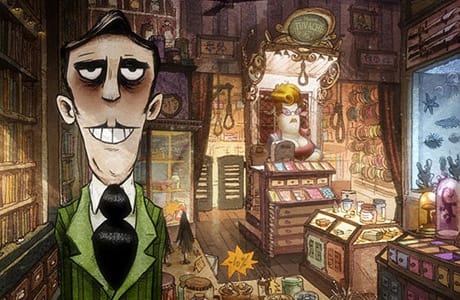Though based on the Jean Teulé novel of the same name, Patrice Leconte's 3D animated adaptation is a more compressed and streamlined story, dropping plot points about a suicide camp and post-apocalyptic climate change in favour of a simpler tale about the proprietors of the titular Suicide Shop.
Like a French variation on the gothic Tim Burton aesthetic ― comic book cut-outs and watercolours replace stop motion animation and intricate art design ― this adult cartoon mixes gloom with referential black comedy, making accessible the morbid and bleak. As the title suggests, the Tuvache family runs a pharmacy of sorts where clients come not to cure ailments, but to find a unique tool or product to assist them with suicide.
As told through a variety of bland, interchangeable musical numbers, the rationale for a society obsessed with suicide is merely a glibly observed status quo of generalized malaise, or that of complacency to social trends. Examinations of psychology and depression are unimportant to Leconte, which is made abundantly clear by the film's antagonist, Alan, a child born into the Tuvache family with an unfortunate disposition: happiness.
As the Tuvache patriarch attempts to modify his son's behaviour, this moderately tedious allegory suggests the didactic, in the form of promoting discernment amidst a legion of lemmings. Alan represents a contrary ideology and is resultantly categorized as "problematic" within the existing system. But as things progress forward, this plea for greater consciousness shifts to something more naive and patronizing, suggesting that the only thing a depressed person needs to feel better about life is to turn their frown upside down, or to look at the glass as half-full.
Furthermore, there's an entire musical number wherein Alan's older sister, Marilyn, dances nude in her bedroom while he watches and remarks on her beauty. This suggests an overall perversion and distortion of sexual roles within this constructed society that are dropped entirely once Alan decides to "change the world" by playing loud dance music in public locales (yes, apparently that's all we need to be happy in life).
It's surprising that such an idealistic and insulting parable came from Patrice Leconte, the man behind The Widow of St. Pierre and Monsieur Hire. Perhaps in reaching out to a different, possibly broader audience, he attempted to simplify and edify, which just doesn't work coming from someone that knows better.
(eOne)Like a French variation on the gothic Tim Burton aesthetic ― comic book cut-outs and watercolours replace stop motion animation and intricate art design ― this adult cartoon mixes gloom with referential black comedy, making accessible the morbid and bleak. As the title suggests, the Tuvache family runs a pharmacy of sorts where clients come not to cure ailments, but to find a unique tool or product to assist them with suicide.
As told through a variety of bland, interchangeable musical numbers, the rationale for a society obsessed with suicide is merely a glibly observed status quo of generalized malaise, or that of complacency to social trends. Examinations of psychology and depression are unimportant to Leconte, which is made abundantly clear by the film's antagonist, Alan, a child born into the Tuvache family with an unfortunate disposition: happiness.
As the Tuvache patriarch attempts to modify his son's behaviour, this moderately tedious allegory suggests the didactic, in the form of promoting discernment amidst a legion of lemmings. Alan represents a contrary ideology and is resultantly categorized as "problematic" within the existing system. But as things progress forward, this plea for greater consciousness shifts to something more naive and patronizing, suggesting that the only thing a depressed person needs to feel better about life is to turn their frown upside down, or to look at the glass as half-full.
Furthermore, there's an entire musical number wherein Alan's older sister, Marilyn, dances nude in her bedroom while he watches and remarks on her beauty. This suggests an overall perversion and distortion of sexual roles within this constructed society that are dropped entirely once Alan decides to "change the world" by playing loud dance music in public locales (yes, apparently that's all we need to be happy in life).
It's surprising that such an idealistic and insulting parable came from Patrice Leconte, the man behind The Widow of St. Pierre and Monsieur Hire. Perhaps in reaching out to a different, possibly broader audience, he attempted to simplify and edify, which just doesn't work coming from someone that knows better.
